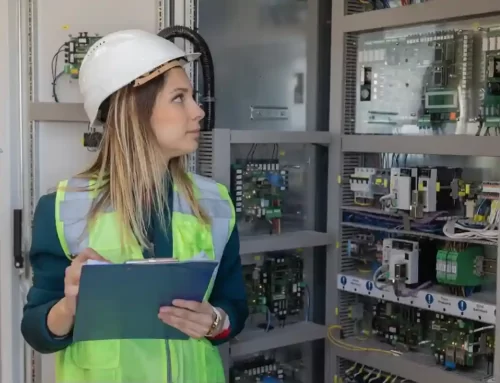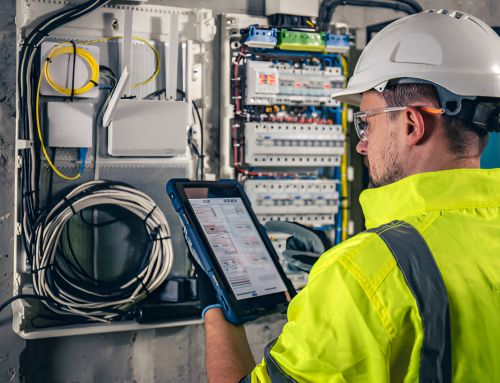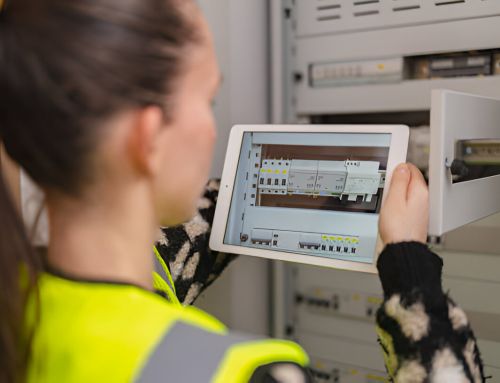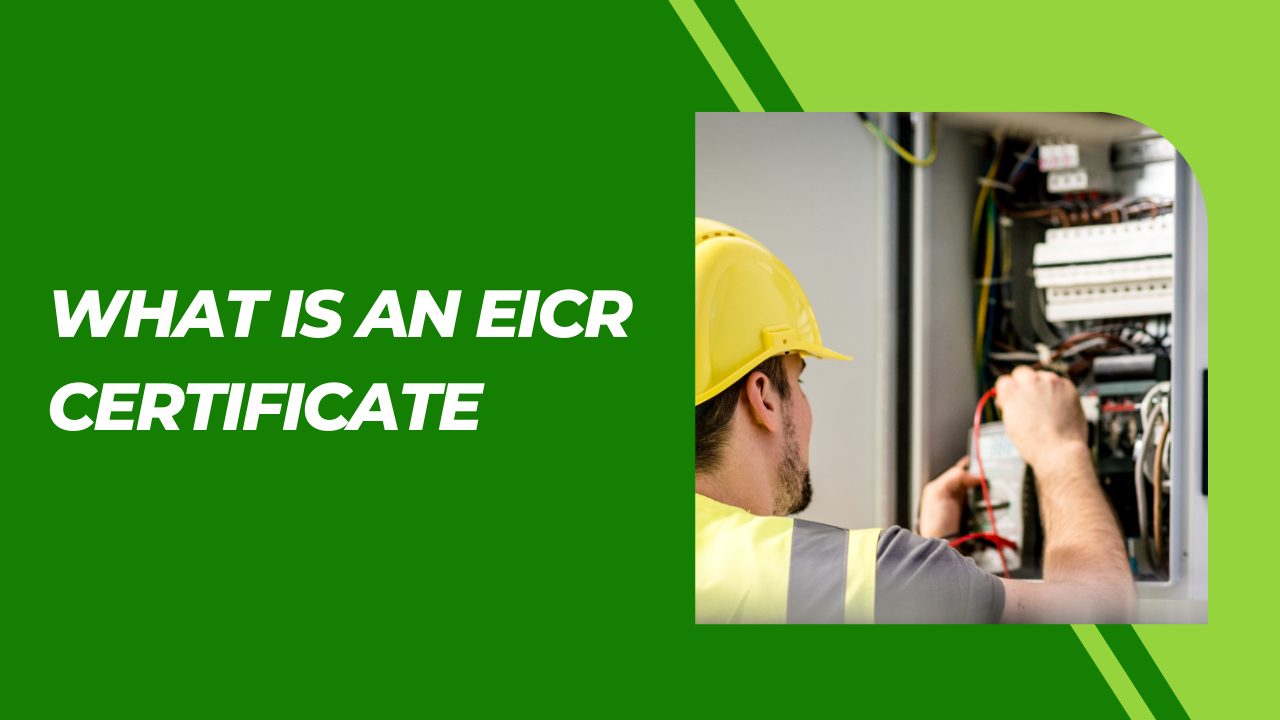
An EICR Certificate, also known as the Electrical Installation Condition Report, is an important document that showcases the condition of electrical installations in a property. This report is vital for identifying defects, deterioration, damages, or conditions that may pose potential dangers. It provides detailed recommendations for improving the property’s electrical setup, guaranteeing safety and compliance with regulations.
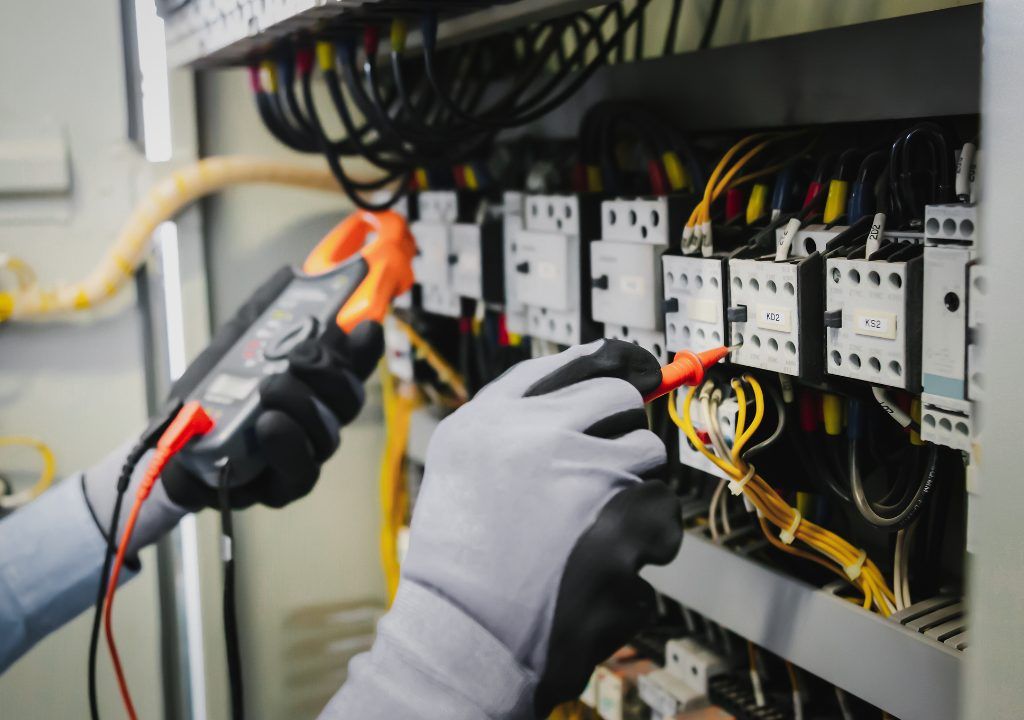
The classifications in the report, such as C1 (Danger present) and C2 (Potentially dangerous), highlight the severity of any issues found. As an essential legal requirement, only qualified electricians are authorized to conduct EICRs. Regular testing, typically every 5 to 10 years depending on the property type, is necessary to monitor the condition of electrical systems and prevent risks.
The cost of an EICR can vary based on factors like property size, age, and location, with additional remedial works potentially increasing expenses. Being proactive with EICRs not only ensures safety but also helps in maintaining a secure and compliant property environment.
Legal Requirements for EICRs
Pivoting from the discussion on understanding the EICR Certificate, compliance with legal requirements for EICRs is a fundamental aspect that landlords and property owners must prioritize.
In Scotland, landlords are obligated to possess an EICR Certificate to guarantee tenant safety and adhere to the Repairing Standard Housing Act 2006 and Housing (Scotland) Act 2014, Section 19A.
This certification not only enforces compliance with standards but also fulfills legal obligations under the Housing Act, emphasizing the significance of safety in rental properties.
The provision of the EICR Certificate to tenants is essential to demonstrate adherence to regulations and commitment to maintaining a secure living environment.
By aligning with legal requirements, landlords not only safeguard their properties but also mitigate potential penalties associated with non-compliance.
Hence, upholding these legal obligations is paramount in upholding safety standards and ensuring the well-being of tenants.
Benefits of the EICR Certificate
Enhancing safety standards through the EICR Certificate is essential for landlords and property owners. Having an EICR Certificate guarantees tenant safety, protects the property from hazards, enhances the landlord’s reputation, and complies with insurance requirements. It provides peace of mind for tenants and helps maintain a safe living environment.
By identifying potential dangers, defects, and damages, the EICR Certificate plays an important role in preventing costly damages and legal consequences. Additionally, it demonstrates a commitment to safety and compliance with regulations, which is important for landlords to fulfill their legal responsibilities. The certificate not only safeguards the property and its occupants but also helps in avoiding potential legal repercussions.
The EICR Inspection Process
Commencing an EICR inspection involves a thorough examination of electrical components, specialized testing procedures, and meticulous documentation of findings in the subsequent report. During the inspection process, various elements are assessed to guarantee the safety and compliance of the electrical systems. Below is a breakdown of the key aspects covered during an EICR inspection:
| Aspect | Description | Importance |
|---|---|---|
| Earthing and Bonding | Evaluation of the grounding system and bonding connections to prevent electric shocks and guarantee safety. | Critical for electrical safety |
| Device Protection | Testing the protective devices to confirm they function correctly in case of overcurrent or short circuits. | Prevents fire hazards |
| Damage Assessment | Examination of electrical fittings and wiring for any signs of damage, wear, or deterioration. | Identifies potential risks |
These components are meticulously evaluated to determine the condition of the electrical installation and identify any hazards or defects that may compromise safety or regulatory compliance.
EICR Certificate Costs

Conducting an EICR inspection involves evaluating various elements to determine the condition of electrical installations and identify potential hazards or defects. When considering EICR certificate costs, factors such as property size, type, number of installations, location, and certificate validity play a significant role.
The expense can vary depending on the area and the service provider chosen. For instance, Mashroom offers EICR inspections for £225, serving as an affordable option for landlords seeking compliance. Legally required every five years, the frequency of testing might differ based on the electrician’s recommendation.
Additionally, there may be a need for a re-inspection every three years to maintain ongoing safety and compliance. Understanding these cost dynamics is important for landlords to budget effectively and fulfill their legal obligations while safeguarding the well-being of tenants.
Consequences of Non-Compliance
Non-compliance with EICR regulations can result in severe legal repercussions for landlords. Failure to adhere to Electrical Installation Condition Report requirements can lead to legal prosecution, substantial penalties, and rent penalty notices. Such non-compliance jeopardizes tenant safety and property standards, emphasizing the critical need for landlords to prioritize EICR certification.
By ensuring compliance with EICR regulations, landlords can avoid legal consequences, maintain property safety, and uphold their legal obligations. Proactive adherence to EICR guidelines not only safeguards tenants but also protects landlords from the risks associated with non-compliance.
Prioritizing the EICR process is essential for landlords to fulfill their duty of care, uphold regulatory standards, and avoid the serious ramifications of neglecting electrical safety measures. By promptly addressing EICR requirements, landlords can mitigate legal risks, uphold property standards, and demonstrate a commitment to maintaining a safe living environment for tenants.
EICR for Business Owners
For business owners, obtaining an EICR certificate is essential to guarantee compliance with stringent electrical safety regulations and mitigate potential hazards in commercial properties. As a business owner, securing the safety and well-being of employees, customers, and visitors is paramount. Government regulations mandate periodic EICR inspections to identify and address electrical faults promptly.
These inspections demonstrate a commitment to safety, reducing the risk of fire outbreaks, electric shocks, or equipment failures that could lead to accidents, legal liabilities, and damage to reputation and financial stability. Detecting and resolving issues early through EICR assessments can prevent costly repairs and downtime, contributing to business continuity.
Moreover, holding a valid EICR certificate enhances your business’s reputation by showcasing a dedication to safety, quality, and professionalism. Overall, investing in EICR inspections not only ensures compliance with regulations but also contributes to risk reduction, cost savings, and the enhancement of your business’s credibility and operational efficiency.
EICR and UK Regulations

Shifting from the discussion on EICR for business owners, the focus shifts to examining the regulatory framework surrounding EICR and its implications in the UK.
| Regulation | Description | Implications |
|---|---|---|
| Electricity at Work Regulations 1989 (EAWR) | Ensures electrical systems are safe and prevent danger to employees and the public. | Businesses must comply with these regulations to maintain a safe working environment. |
| Health and Safety at Work Act 1974 | Imposes general duties on employers to guarantee the health, safety, and welfare of employees. | Failure to adhere to this act can lead to legal consequences and risk the well-being of employees. |
| Building Regulations Part P | Focuses on electrical safety in dwellings to decrease the risk of electric shocks and fires. | Compliance is necessary for landlords and homeowners to maintain the safety of residents. |
| IET Wiring Regulations (BS 7671) | Provides standards for electrical installations to protect people from electrical shock and fires. | Adherence is important to guarantee that electrical installations are safe and meet legal requirements. |
| Landlord and Tenant Act 1985 (as amended by the Housing Act) | Outlines obligations of landlords to maintain the property’s electrical installations in good repair and working order. | Landlords must fulfill these obligations to guarantee tenant safety and comply with legal requirements. |
Understanding and complying with these regulations is important to maintain safety, prevent legal repercussions, and uphold the well-being of individuals in the UK.
Frequently Asked Questions
Can a Homeowner Conduct Their Own EICR Inspection, or Does It Need to Be Done by a Qualified Electrician?
I can’t conduct my EICR inspection; a qualified electrician is needed. It guarantees safety, identifies hazards, and meets legal requirements. Regular checks are essential. DIY inspections risk missing critical issues and jeopardize safety and compliance.
Are There Any Specific Requirements for EICR Certificates in Properties With Solar Panels or Other Renewable Energy Sources?
In properties with solar panels or renewable energy sources, specific EICR requirements focus on ensuring safe integration, functionality, and compliance. Regular assessments by qualified electricians are essential to identify potential risks and maintain system integrity.
How Long Does an EICR Inspection Typically Take to Complete for a Standard Residential Property?
Typically, an EICR inspection for a standard residential property takes around 2-4 hours, based on property size and complexity. It involves a thorough examination of electrical installations, testing, and report generation by a qualified electrician.
Is It Necessary to Notify Tenants in Advance Before Conducting an EICR Inspection in a Rental Property?
Yes, it is necessary to notify tenants in advance before conducting an EICR inspection in a rental property. Providing prior notice guarantees transparency, respects tenants’ rights, and allows for proper scheduling to facilitate a smooth and compliant inspection process.
Are There Any Specific Qualifications or Certifications That an Electrician Must Have to Be Eligible to Perform EICR Inspections?
To perform EICR inspections, electricians must hold relevant qualifications like City & Guilds 2391 or 18th Edition Wiring Regulations. Certifications from NICEIC, ELECSA, or other approved bodies are critical. Compliance guarantees accurate and safe assessments.
Conclusion
In summary, the EICR certificate is an essential document that guarantees electrical safety and compliance for both landlords and tenants.
By understanding its importance, complying with legal requirements, and investing in regular inspections, property owners can prevent hazards, maintain a safe living environment, and uphold their legal responsibilities.
The EICR certificate serves as an important tool in safeguarding properties, promoting peace of mind, and ensuring the well-being of occupants.
About the Author: LandlordCertificate
Related Posts
Get Social
Recent Posts
- EICR Report Validity: How Long Before You Need a New One?
- Fire Risk Assessment Report London: Essential Steps and Legal Requirements
- Reliable Gas Safety Inspection by Gas Safe Registered Engineers
- The Role of Fire Extinguisher Inspection in Fire Risk Management
- How to Stay Compliant with Emergency Lighting Test Certificate Rules


